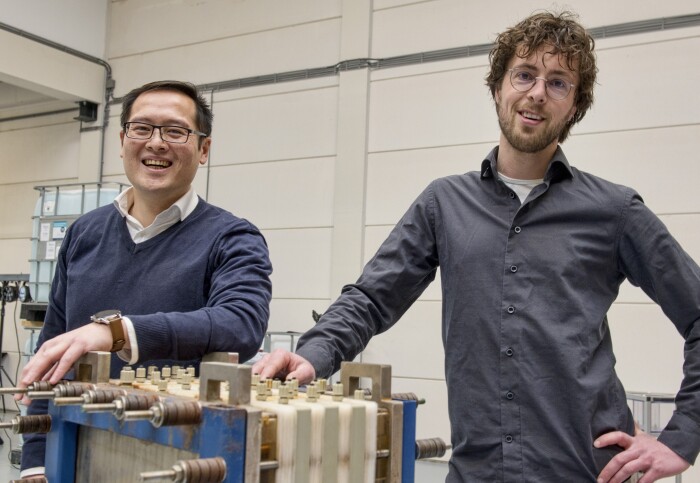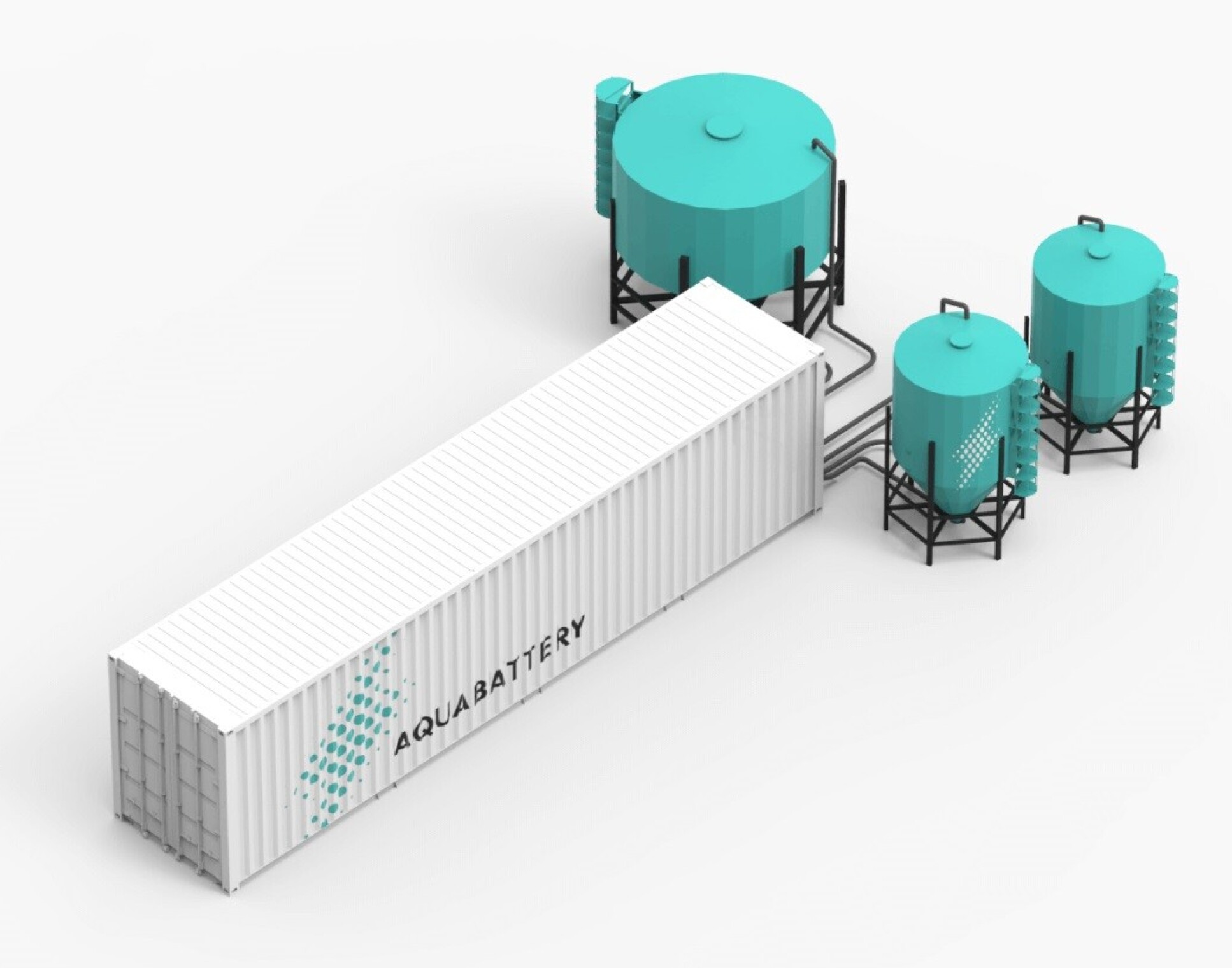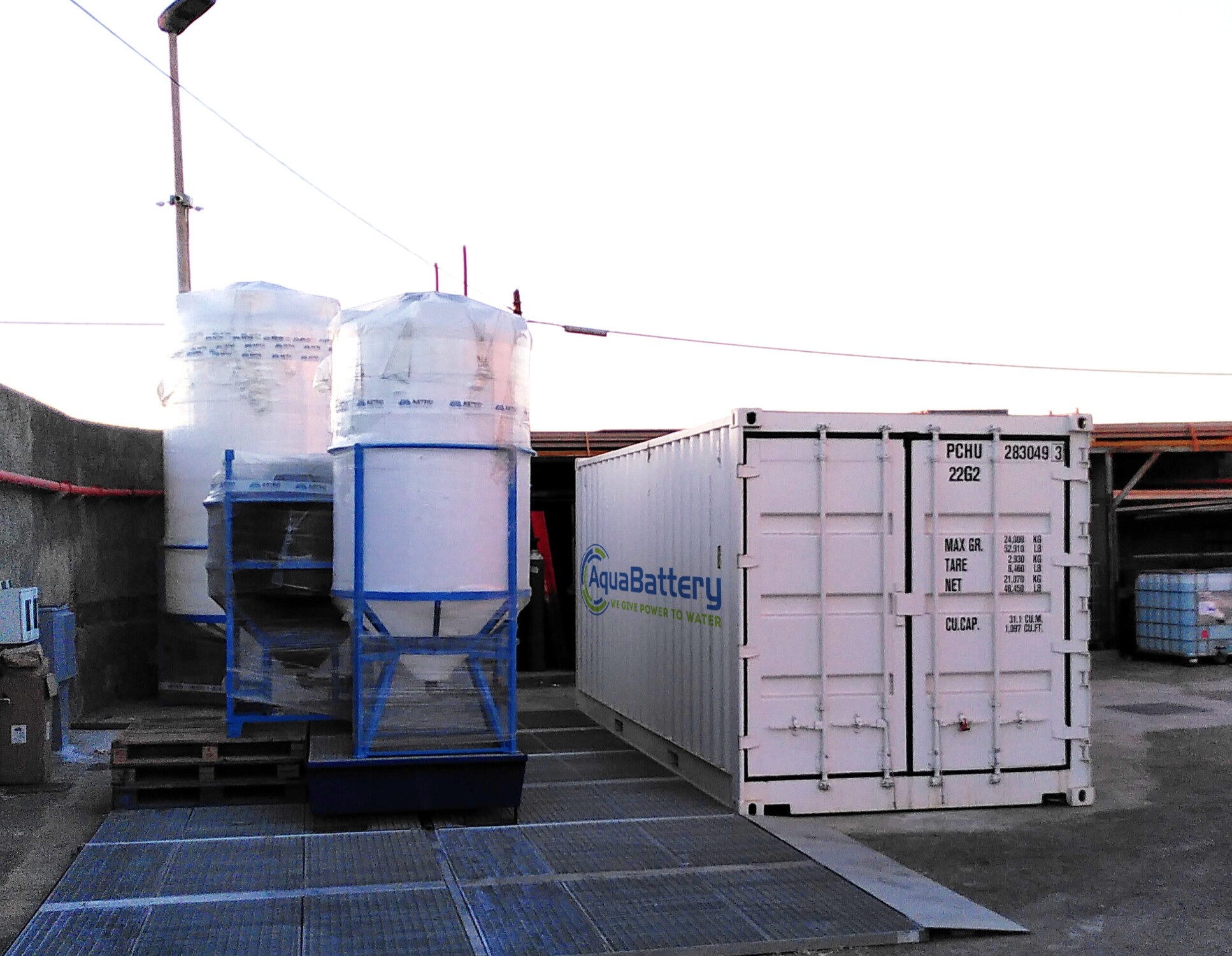AquaBattery raises €6m in seed funding to deploy flow battery technology
by Ian Mundell

AquaBattery co-founders Jiajun Cen and Emil Goosen
A flow battery driven by ordinary salt water promises a low-cost, sustainable way of integrating renewable energy into the electricity grid.
AquaBattery, a startup co-founded by Imperial graduate Dr Jiajun Cen, has closed a €6 million seed investment round. The money will support further development of a low-cost, sustainable energy storage solution based on salt water, which Dr Cen conceived while studying for a PhD in the Department of Chemical Engineering at Imperial.
The company is developing a novel flow battery that can store electricity in ordinary salt water. When charging, the battery converts the salt water into acid and base, which are stored in separate tanks. The reaction is then reversed when the power needs to be released.

The technology’s ability to store energy efficiently for relatively long periods of time means it can help integrate renewable energy sources into the electricity grid, holding excess power during periods of peak production and releasing it when production drops.
This deal confirms the key role we expect flow batteries to play in our future energy system. Roel van Diepen EIT InnoEnergy Benelux
The new investment is a significant milestone in AquaBattery’s plan to bring its technology to the market by 2026. “The capital will catalyse the development of our first standardised battery module and boost the hiring of top-tier talent to the team,” said Dr Cen. The company is preparing to launch its fourth pilot battery at an office campus in Delft this autumn.
"This deal confirms the key role we expect flow batteries to play in our future energy system as we see the technology maturing into commercially viable solutions," commented Roel van Diepen, Investment Director EIT InnoEnergy Benelux, which led the investment round. Other contributors included InnovationQuarter, Invest-NL, Init Power, and a group of business angels.
Linking London with the Netherlands
AquaBattery is based in the Netherlands, where Dr Cen grew up and completed his Bachelor and Master’s degrees, before coming to Imperial for his PhD in Chemical Engineering. During his studies in London he actively pursued entrepreneurship as a career option, following a mini MBA programme at the Imperial College Business School and working, at the time, as chief technology officer with Desolenator, a startup developing a solar-powered water purification system.
After graduating in 2019, Dr Cen spent several more years in the Department of Chemical Engineering as a visiting researcher, while developing AquaBattery as a company.

In 2022, it secured a €2.5 million grant from the European Innovation Council’s Accelerator programme to move its technology forwards. Since then, it has won further grant funding and signed collaboration agreements with Norwegian renewables company Statkraft and knowledge institute Deltares to explore applications for its battery technology.
Meanwhile, AquaBattery continues to collaborate with researchers in the UK to develop its technologies. In particular, the company is working with Imperial to test new ion exchange membranes, which are critical for efficient conversion of saltwater to acid and base in its flow batteries.
As the UK has rejoined Horizon Europe, we are delighted to continue international collaborations with academics and companies in the EU to solve challenges such as sustainable energy storage. Dr Qilei Song Department of Chemical Engineering
This component is the costliest part of the system, so the startup is working with Dr Qilei Song and other Imperial scientists to develop better-performing, low-cost membranes. Feasibility studies of membranes in the flow battery stack are currently supported by a European Research Council Proof of Concept Grant, funded through the UK government’s Horizon Europe Guarantee.
AquaBattery and Imperial are also seeking other funding opportunities to develop new flow battery membranes, for example through a proposal submitted to the European Innovation Council.
“As the UK has rejoined the EU’s Horizon Europe programme, we are delighted to continue international collaborations with academics and companies in the EU, including AquaBattery, to solve some of our greatest challenges, such as sustainable energy storage,” said Dr Song.
Article text (excluding photos or graphics) © Imperial College London.
Photos and graphics subject to third party copyright used with permission or © Imperial College London.
Reporter
Ian Mundell
Enterprise